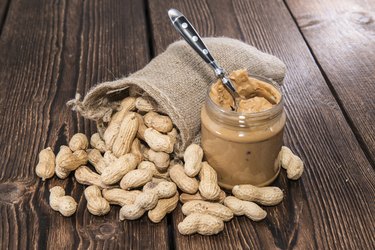
Peanut butter is made by grinding roasted peanuts into a paste. The National Digestive Diseases Information Clearinghouse, or NDDIC, reports that foods comprised mainly of fat and protein -- including peanut butter -- are not likely to cause flatulence. Other nutrients in in the peanut butter, however, such as fiber and carbohydrates, are a trigger for gas. Peanuts also are among the eight foods most often to cause allergy, and flatulence is a mild symptom of a food allergy and intolerance.
About Flatulence
Video of the Day
Most Americans pass gas about 14 times a day, according to Medical News Today. Excessive flatulence can be caused by smoking, swallowing too much air, bacteria in the colon and eating certain kinds of food. Foods that tend to cause gas the most are those that are rich in fiber, dietetic foods -- those that are specially manufactured to satisfy a particular nutritional requirement -- and those that are sugar free. Considering that 2 tablespoons of chunky peanut butter has 3 grams of fiber, according to the U.S. Department of Agriculture's National Nutrient Database, it is not unusual for some people to have gas after eating a PB&J sandwich. Jennifer Anderson, Colorado State University Extension food and nutrition specialist and professor, explains that 2.5 to 4.9 grams of fiber is considered a "good source of fiber." To reduce your chances of gastrointestinal discomfort, try eating a smooth peanut butter, which can have about 2 grams of fiber -- slightly less than a chunky variety.
Video of the Day
Carbohydrates
Carbohydrates are another known cause of flatulence, according to the NDDIC. Chunk peanut butter contains about 6 to 7 grams of carbs, depending on the brand. People who lack a certain enzyme in the small intestine may have problems digesting carbs, explains the NDDIC. The undigested food moves to the large intestine, where bacteria breaks down the peanut butter, and in about a third of people produces methane gas that exits through the rectum. The amount of carbohydrates that causes a gastrointestinal reaction is different for each individual.
Allergy
The Food Allergy and Anaphylaxes Network reports that peanuts are one of the most common food allergens. When you have an allergy, that substance triggers your immune system to attack itself. Symptoms of a peanut allergy occur immediately and are often severe. A mild reaction, however, can lead to cramps, gas, diarrhea, nausea or vomiting.
Intolerance vs. Allergy
An intolerance is a digestive response to food that can include indigestion, flatulence and loose stools. An allergy, on the other hand, causes an immediate immune-system response that can affect many different organs.Peanuts are a common cause of food intolerance as well as allergy. If you have an allergy to peanuts, even the smallest amount causes an allergic reaction. If your only response to peanuts is some gas after eating peanut butter, you could just be intolerant rather than allergic.
- Medical News Today: What is Flatulence?
- Food and Allergy Anaphylaxes Network: Peanut Allergy
- KidsHealth; Food Allergies; January 2008
- National Digestive Information Clearinghouse: Gas in the Digestive Tract; January 2008
- TestCountry; Most Common Nuts That Cause Food Intolerance; November 2009
- U.S. Department of Agriculture National Nutrient Database
- University of Colorado Extenstion; Dietary Fiber; Jennifer Anderson; December 2010
- The Peanut Institute; Health and Nutrition Research
- International Journal of Drug Formulation and Research; Flatulence A Chronic Gastric Upset in Today's Hectic Lifestyle; Arun N. Borakhatariya; April 2011